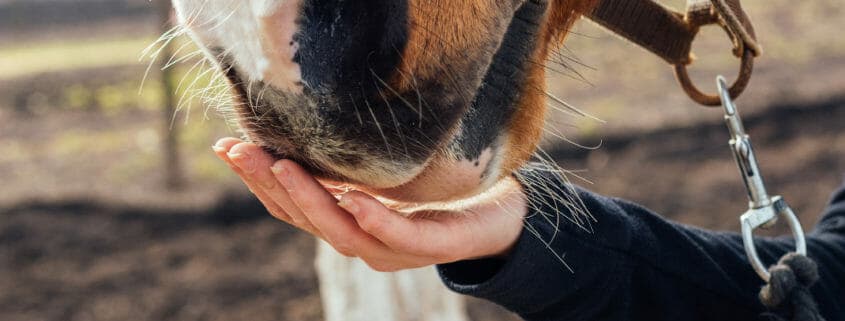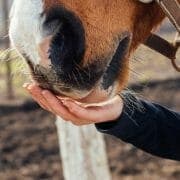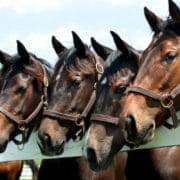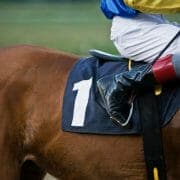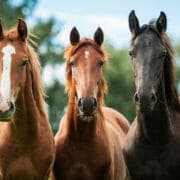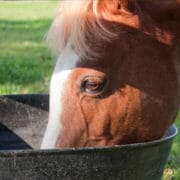Feeding Senior Horses
There is little more precious than the old horse around the place. These senior horses are often the dependable ones that look after a novice rider or give a young horse some confidence when out on the trails. Because they are so valuable and literally have a lifetime of experience under their ‘girth’, we want to do our best to keep them around as long as possible. While good veterinary, farrier and dental care are important for maintaining the long-term health of your geriatrics, their health care should always be based on a solid foundation of good nutrition and feeding practices.
As horses age, they go through several physiological changes that affect how and what you should feed to keep them as healthy as possible. Detailed below are four of the most important of these changes and how you can best manage them from a feeding and nutrition perspective.
1. Teeth wear
As a horse gets older, its teeth eventually stop growing and will gradually start to wear down until chewing becomes difficult or ineffective.
Worn incisors (upper and lower front teeth) make it difficult for senior horses to graze as the top and bottom incisors need to make good contact in order to shear the pasture off. If a horse has worn or damaged incisors, but its molars used for grinding feed are still in good condition, feeding hay will allow the horse to readily get the forage into its mouth simply using its lips and tongue (no need for incisors). Once it is in the mouth the horse can use its molars to grind the forage as normal.
However, worn or damaged molars mean grinding feed also becomes difficult, so feeding hay is not a good idea as the horse can’t chew it enough to be swallowed and digested. Feed forage that has already been extensively chopped up or processed. Forages like short-chopped chaff or soaked hay cubes and pellets are good alternate forages for horses with no effective molars. Fibres like sugarbeet pulp and soybean hulls may also be used to increase an old horse’s fibre intake when they are no longer able to graze or eat hay.
If you are feeding grains, the grains should always be well processed (boiled, extruded, or pelleted) before being fed so the grain can still be digested even if they are not effectively chewed. Never feed whole grains to senior horses that can’t chew very well.
2. Hindgut loses some function
It is thought that as horses age their hindgut loses some of its ability to ferment fibre. This is likely due to changing populations of bacteria in the hindgut associated with ageing. A reduction in fibre fermentation means that older horses get less of the goodness out of forage (which partly explains why old horses need to be fed more to maintain their bodyweight).
Because the hindgut is not as effective at fermenting fibre, there should be a focus on feeding high quality forages with fibre that is easy to ferment. Lucerne/alfalfa hay and good quality, soft meadow/pasture hays are preferable to stemmy and mature hays that have tougher fibre to ferment. High energy ‘super fibres’ like sugarbeet pulp and soybean hulls are also excellent sources of fibre for older horses as they are very easy to ferment in the hindgut.
Some yeast-based pre‐biotics (which are used in many different feeds and supplements) have been shown to improve the digestion of fibre in the hindgut, so they may make a useful contribution to the diet of aged horses.
It is also likely that the hindgut of older horses doesn’t support the production of B‐vitamins as well as a younger horse’s gut does. Thus, it may be necessary to supply more B‐vitamins in the diet. FeedXL takes this into account and has raised B‐vitamin requirements for aged horses. The production of biotin may also be reduced in older horses so it may need to be added to the diet of older horses. For more information on supplementing with biotin, read our post ‘Biotin – should you supplement?’.
As horses age, they also find it harder to absorb phosphorous from the hindgut. Again, FeedXL takes this into account and has raised phosphorous requirements for aged horses.
3. Small intestine loses some function
In studies we conducted at The University of New England we found that an older horse had much lower concentrations of carbohydrate digesting enzymes in its small intestine than younger horses had. While it was a limited study with small horse numbers, it is likely that as horses age their ability to digest carbohydrates like starch in their small intestine is reduced. This means digesting feeds like grains becomes difficult (which also contributes to older horses needing to be fed more to hold their bodyweight).
So, aged horses should always be fed cooked grains that have been boiled, extruded, pelleted, micronised or steam flaked so that the starch they contain is easy to digest. If you suspect your horse has difficulty digesting grains look for a feed that has added starch digesting enzymes or use a supplement that contains enzymes like amylase and amyloglucosidase to help with the digestion of the grains.
Older horses also find it harder to digest protein in the small intestine and some with reduced liver and kidney function can also find it difficult to excrete waste products associated with eating too much protein. So, the key to feeding protein to older horses is to use high quality protein from lucerne/alfalfa, soybean, lupins, canola meal or faba beans to satisfy without oversupplying their requirements.
4. Mobility is reduced
Perhaps the most obvious change in an older horse is some loss of mobility. Because they can’t get around so easily, try to have them in pastures that have the feed and water sources reasonably close together, so they don’t have to travel long distances for feed or water.
You will also probably find that if they are kept in a herd, they will slowly fall down the pecking order as they become easier to boss around. If this happens you should feed your old horse separately to avoid him having all his feed pinched by the younger horses higher in the order.
Take home message:
If you keep in mind the physiological changes occurring in your horse as he ages it will help you to adjust feeding accordingly. Feeding forages that are easy to chew and digest, grains that have been well cooked, increasing the intake of nutrients like phosphorous and B‐vitamins, providing good quality protein, and being aware of any mobility issues that may affect feed intake will help keep your oldies happy and healthy for years to come.
Join FeedXL today and take control of your horse’s nutrition
Get EVEN MORE practical and personalised feeding guidance when you sign up to FEEDXL.
Do you have a question or comment? Do you need help with feeding?
We would love to welcome you to our FeedXL Horse Nutrition Facebook Group. Ask questions and have them answered by PhD and Masters qualified equine nutritionists and spend time with like-minded horse owners. It’s free!
Click here to join the FeedXL Horse Nutrition Facebook Group

